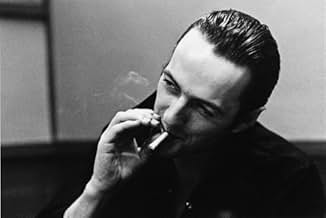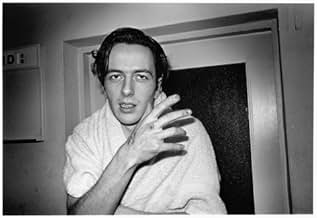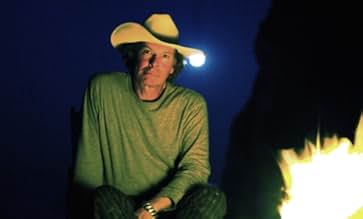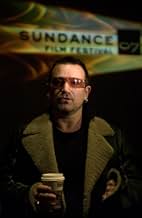IMDb-BEWERTUNG
7,5/10
4315
IHRE BEWERTUNG
Füge eine Handlung in deiner Sprache hinzuAs the front man of the Clash from 1977, Joe Strummer changed people's lives forever. Four years after his death, his influence reaches out around the world, more strongly now than ever befo... Alles lesenAs the front man of the Clash from 1977, Joe Strummer changed people's lives forever. Four years after his death, his influence reaches out around the world, more strongly now than ever before.As the front man of the Clash from 1977, Joe Strummer changed people's lives forever. Four years after his death, his influence reaches out around the world, more strongly now than ever before.
- Auszeichnungen
- 1 Gewinn & 4 Nominierungen insgesamt
Joe Strummer
- Self
- (Archivfilmmaterial)
The 101ers
- Themselves
- (Archivfilmmaterial)
Brigitte Bardot
- Self
- (Archivfilmmaterial)
Mark 'Bez' Berry
- Self
- (as Bez)
Big Audio Dynamite
- Themselves
- (Archivfilmmaterial)
The Clash
- Themselves
- (Archivfilmmaterial)
Peter Cushing
- Winston Smith
- (Archivfilmmaterial)
Empfohlene Bewertungen
Joe Strummer: The Future is Unwritten is maybe the first time one has seen a documentary done a "punk rocker" like this, where it's a story of the ups and downs and valleys and little peaks for a rock star done in the style of Eisenstein caught in the midst of a room covered with punk garb and an assistant with a mohawk. It mixes archival footage, interviews, movie footage from Animal Farm and 1984, Peter Cushing movies and Raging Bull, as well as a kind of loose structure formed out of 'London Calling' radio clips that Strummer did with his own music choices for his audience, and it's a mix that the suits the director wonderfully. His previous film was a revisionist take on the Sex Pistols- maybe the masterpiece of punk-rock docs, the Filth and the Fury- and the Future is Unwritten comes just as close to the subliminally, anger, trouble, and creative spirit that went with its subject matter.
Can anyone completely know Joe Strummer? Probably the same could go for Bob Dylan, who also has a movie about him out now that stretches the boundaries of cinema in I'm Not There. Temple raises questions for the fans of the Clash who might've not known certain things; that Strummer could be a very generous front-runner to the fans that needed help, and could also get p-od if his audience wasn't in some check with himself (or rather that they could be connecting with the audience and not some abstract rock-blob, which they feel they become by the time of Shea stadium); that towards the end of the Clash it was just Strummer and his management team (!); that Strummer anguished for the better part of a decade over how his career would go- this part I did know- that he went into some movies, made a horrible effort to get out of his record contract, and drifted in the tide of experiencing whatever for inspiration. His tale is more enigmatic than most, but as any artist he was many things at any time: moody to a fault, pushy, pleasant, quiet, frustrated, quixotic, and always with ideas that could come from anywhere, from Central American rebel uprisings to his walk from one place to another.
It is, more often than not, a sad film, probably more-so than the destructive tome on the Pistols, because Temple brings up many 'what-ifs', and a lot of the loneliness that could encompass Strummer (i.e. the scene when he's recording for days on end by himself in the studio shows him frayed and frazzled, as he sometimes appears in interviews too) and carried around him with, as any major rock and roll personality has, a rotten past and family history (father, brother, et all). But all those moments when Temple gets the audience to really feel the weight of the fact that such a man has been gone for good for five years now, he also reminds us brilliantly what he DID accomplish. There is a mark left from him, on his fans and on his loved ones and on the likes of Bono and Scorsese and (as funny as it is to see him Jack Sparrow-ed up) Depp, not to mention practically any *good* punk band.
Strummer was a thinking-man's punk, one who's lyrics could be taken into context of political and social significance, and had the stamina- along with his rowdy band-mates- to try and do what few rock bands could ever do: make a significant impact on consciousness, as if it were intuitive to do so. That they were eclectic didn't hurt either (even if, arguably, the Clash were more significant than the Mescaleros could ever be). And, in the end, the Future is Unwritten is mandatory viewing for anyone who gave a g*damn about the Clash or about the progression of the creative forces that started, actually, in folk and hippie music, progressed through punk, and went back out again into techno and, gasp, hippies and punks combined! It's daring for what's in-between the lines of the typical rock and roller story, and how Temple and his team make one of the best edited films of the year.
Can anyone completely know Joe Strummer? Probably the same could go for Bob Dylan, who also has a movie about him out now that stretches the boundaries of cinema in I'm Not There. Temple raises questions for the fans of the Clash who might've not known certain things; that Strummer could be a very generous front-runner to the fans that needed help, and could also get p-od if his audience wasn't in some check with himself (or rather that they could be connecting with the audience and not some abstract rock-blob, which they feel they become by the time of Shea stadium); that towards the end of the Clash it was just Strummer and his management team (!); that Strummer anguished for the better part of a decade over how his career would go- this part I did know- that he went into some movies, made a horrible effort to get out of his record contract, and drifted in the tide of experiencing whatever for inspiration. His tale is more enigmatic than most, but as any artist he was many things at any time: moody to a fault, pushy, pleasant, quiet, frustrated, quixotic, and always with ideas that could come from anywhere, from Central American rebel uprisings to his walk from one place to another.
It is, more often than not, a sad film, probably more-so than the destructive tome on the Pistols, because Temple brings up many 'what-ifs', and a lot of the loneliness that could encompass Strummer (i.e. the scene when he's recording for days on end by himself in the studio shows him frayed and frazzled, as he sometimes appears in interviews too) and carried around him with, as any major rock and roll personality has, a rotten past and family history (father, brother, et all). But all those moments when Temple gets the audience to really feel the weight of the fact that such a man has been gone for good for five years now, he also reminds us brilliantly what he DID accomplish. There is a mark left from him, on his fans and on his loved ones and on the likes of Bono and Scorsese and (as funny as it is to see him Jack Sparrow-ed up) Depp, not to mention practically any *good* punk band.
Strummer was a thinking-man's punk, one who's lyrics could be taken into context of political and social significance, and had the stamina- along with his rowdy band-mates- to try and do what few rock bands could ever do: make a significant impact on consciousness, as if it were intuitive to do so. That they were eclectic didn't hurt either (even if, arguably, the Clash were more significant than the Mescaleros could ever be). And, in the end, the Future is Unwritten is mandatory viewing for anyone who gave a g*damn about the Clash or about the progression of the creative forces that started, actually, in folk and hippie music, progressed through punk, and went back out again into techno and, gasp, hippies and punks combined! It's daring for what's in-between the lines of the typical rock and roller story, and how Temple and his team make one of the best edited films of the year.
I can't say anything of this movie by Julian... My comment is I want to cry.. I was really touched of the movie The Future is Unwritten.. Hoping for the next movie of Julian... ^_^ More Power.
Joe Strummer was born as John Mellor in Ankara, Turkey on August 21, 1952. His father was a British foreign-service diplomat; his mother, a nurse, was a crofters's daughter from the Scottish Highlands. The family spent much time moving from place to place, and Strummer spent his childhood in a variety of countries. At the age of 9, Strummer and his older brother David, 10, began boarding at the City of London Freemen's School in Surrey. Strummer rarely saw his parents during this time. He developed a love of rock music, listening to records by The Beatles and The Beach Boys, as well as American folk-singer Woody Guthrie (Strummer would even go by the name "Woody" for a few years, until changing his name to "Joe Strummer" a year and a half before the Clash was formed). Strummer was never very close to his brother David, but nonetheless David's suicide significantly changed Joe's outlook on life. After finishing his time in boarding school in 1970 Strummer moved on to London's Central School of Art & Design, where he briefly flirted with the idea of becoming a professional cartoonist. During this time, Strummer shared a flat in the north London suburb of Palmers Green with friends Clive Timperley and Tymon Dogg.
For those who didn't know who is Joe Strummer and for those who haven't seen the movie yet...
Joe Strummer was born as John Mellor in Ankara, Turkey on August 21, 1952. His father was a British foreign-service diplomat; his mother, a nurse, was a crofters's daughter from the Scottish Highlands. The family spent much time moving from place to place, and Strummer spent his childhood in a variety of countries. At the age of 9, Strummer and his older brother David, 10, began boarding at the City of London Freemen's School in Surrey. Strummer rarely saw his parents during this time. He developed a love of rock music, listening to records by The Beatles and The Beach Boys, as well as American folk-singer Woody Guthrie (Strummer would even go by the name "Woody" for a few years, until changing his name to "Joe Strummer" a year and a half before the Clash was formed). Strummer was never very close to his brother David, but nonetheless David's suicide significantly changed Joe's outlook on life. After finishing his time in boarding school in 1970 Strummer moved on to London's Central School of Art & Design, where he briefly flirted with the idea of becoming a professional cartoonist. During this time, Strummer shared a flat in the north London suburb of Palmers Green with friends Clive Timperley and Tymon Dogg.
For those who didn't know who is Joe Strummer and for those who haven't seen the movie yet...
10robo-4
I have to admit I wasn't expecting too much from this documentary, but was really pleasantly surprised. It's not lightweight by any means and may prove difficult for the casual fan - definitely not popcorn material. The sheer amount of research and material that's gone into it is colossal and it could take many repeat viewings to take it all in.
I went away from the film feeling very uplifted and positive - Joe's attitude to life really makes you want to re-evaluate, and the film really captured that, particularly towards the end. Needless to say the soundtrack is absolutely fantastic as well - not just Clash/101-ers/Mescalaros material (which would be enough in itself!) but a really eclectic variety of music of influences from around the world and from many different ages.
I'm going to stick my neck out and declare this is the best music documentary ever made - it really did affect me that much.
I went away from the film feeling very uplifted and positive - Joe's attitude to life really makes you want to re-evaluate, and the film really captured that, particularly towards the end. Needless to say the soundtrack is absolutely fantastic as well - not just Clash/101-ers/Mescalaros material (which would be enough in itself!) but a really eclectic variety of music of influences from around the world and from many different ages.
I'm going to stick my neck out and declare this is the best music documentary ever made - it really did affect me that much.
10vez_kirk
Wow, I was blown away by this film. Despite having been born in 1990, and not having got into punk 'til 1 1/2 years after Joe's death (something I'm constantly kicking myself for), this film made me feel involved in his life + the '70s punk scene, as though I actually lived it. That's the sign of a pretty feckin' good film, if you ask me.
I found the format to be fantastically original (everything from having Joe 'narrate' through his radio show, to the use of his cartoons and the campfire interviews), the content was thorough but not overly concerned with trivial details, and it was just generally a warm, involving + insightful portrayal of Joe's life and the British punk scene.
Fantastic. See it.
I found the format to be fantastically original (everything from having Joe 'narrate' through his radio show, to the use of his cartoons and the campfire interviews), the content was thorough but not overly concerned with trivial details, and it was just generally a warm, involving + insightful portrayal of Joe's life and the British punk scene.
Fantastic. See it.
The majority of the talking heads that are used to frame this film have been captured outdoors next to a bonfire, brazier or something similar there is a reason for it and it is something that you should bear in mind when considering watching this film. The device is a good one and what it does is take sound-bites that could have just felt a bit like scripted puff and turns them into reminiscing round a fire with friends. This fits with the "bigger" comments from band members etc, who do feel like they are sitting reminiscing about the old days but with this comes a problem. You see, the entire film has embraced this approach the approach that we are among friends, people who were all there, know all the stories and love telling them and hearing them even if they have heard them many times before. Not that there is anything wrong with this as an idea because it does offer the potential for an engagingly personal film that perhaps risks inaccuracy via recollection but gets a lot of passion and such in its place.
Unfortunately when taken to an extreme this does risk alienating the casual viewer who is too young to remember and is using the film to fill in them on what they have missed. With this audience sector (which I am in) Julian Temple seems disinterested, even to the point where he doesn't put any captions on the talking heads to tell us who they are. This is irritating because it is hard to shake the feeling that you are looked down on by Temple and perhaps a bit unwelcome as a viewer and it is not a feeling that I ever shook. However, having said that, the personal reflections and observations do help counter this because they do make for an engaging film in terms of feeling if not information. The majority of the footage is "home" video and newsreel footage from the times in question and this is mostly edited together really well to inform and shore up the contributions and feel.
It is not totally successful though even if it was a big improvement on Temple's film on Glastonbury. It doesn't inform a lot and it is so personal that it is hard to always stay with it whenever you do feel like you are being excluded if you're not in the in-crowd. Ironically though, while he seeks this feel at the expense of names on the contributors, he is fine with having famous faces with almost nothing to say in there OK it at least gave me people I could instantly put a name to but otherwise I'm not sure what Cusack, Bono, Depp and others added that anyone with The Clash greatest hits CD on their shelf. Not sure why he bothered to put footage of no relevance in either (such as Animal Farm clips) as it just cluttered it and made it feel like he was trying to be creative by doing what any arty film student would with montages of stock footage.
The Future is Unwritten is an engaging but flawed film that will mostly appeal to those that "were there, man" rather than the casual viewer. The passion and personal feel to the film at least counters the "if you're name's not down you're not coming in" feel that it all has but never totally and, while Temple does produce an interesting structure and feel, it doesn't work as well as he would like to think. A must for fans and perhaps just about good enough for the casual viewer.
Unfortunately when taken to an extreme this does risk alienating the casual viewer who is too young to remember and is using the film to fill in them on what they have missed. With this audience sector (which I am in) Julian Temple seems disinterested, even to the point where he doesn't put any captions on the talking heads to tell us who they are. This is irritating because it is hard to shake the feeling that you are looked down on by Temple and perhaps a bit unwelcome as a viewer and it is not a feeling that I ever shook. However, having said that, the personal reflections and observations do help counter this because they do make for an engaging film in terms of feeling if not information. The majority of the footage is "home" video and newsreel footage from the times in question and this is mostly edited together really well to inform and shore up the contributions and feel.
It is not totally successful though even if it was a big improvement on Temple's film on Glastonbury. It doesn't inform a lot and it is so personal that it is hard to always stay with it whenever you do feel like you are being excluded if you're not in the in-crowd. Ironically though, while he seeks this feel at the expense of names on the contributors, he is fine with having famous faces with almost nothing to say in there OK it at least gave me people I could instantly put a name to but otherwise I'm not sure what Cusack, Bono, Depp and others added that anyone with The Clash greatest hits CD on their shelf. Not sure why he bothered to put footage of no relevance in either (such as Animal Farm clips) as it just cluttered it and made it feel like he was trying to be creative by doing what any arty film student would with montages of stock footage.
The Future is Unwritten is an engaging but flawed film that will mostly appeal to those that "were there, man" rather than the casual viewer. The passion and personal feel to the film at least counters the "if you're name's not down you're not coming in" feel that it all has but never totally and, while Temple does produce an interesting structure and feel, it doesn't work as well as he would like to think. A must for fans and perhaps just about good enough for the casual viewer.
Wusstest du schon
- VerbindungenFeatured in 'Joe Strummer': The Importance of Fire (2007)
Top-Auswahl
Melde dich zum Bewerten an und greife auf die Watchlist für personalisierte Empfehlungen zu.
- How long is Joe Strummer: The Future Is Unwritten?Powered by Alexa
Details
- Erscheinungsdatum
- Herkunftsländer
- Offizielle Standorte
- Sprache
- Auch bekannt als
- Joe Strummer: The Future Is Unwritten
- Produktionsfirmen
- Weitere beteiligte Unternehmen bei IMDbPro anzeigen
Box Office
- Bruttoertrag in den USA und Kanada
- 248.362 $
- Eröffnungswochenende in den USA und in Kanada
- 20.880 $
- 4. Nov. 2007
- Weltweiter Bruttoertrag
- 1.193.491 $
- Laufzeit2 Stunden 4 Minuten
- Farbe
- Sound-Mix
Zu dieser Seite beitragen
Bearbeitung vorschlagen oder fehlenden Inhalt hinzufügen

Oberste Lücke
By what name was The Future Is Unwritten (2007) officially released in Canada in English?
Antwort

































